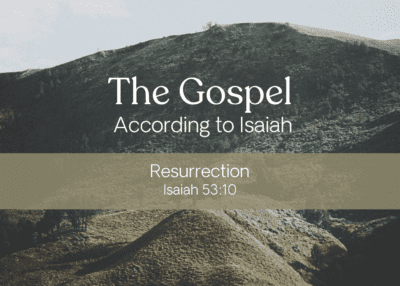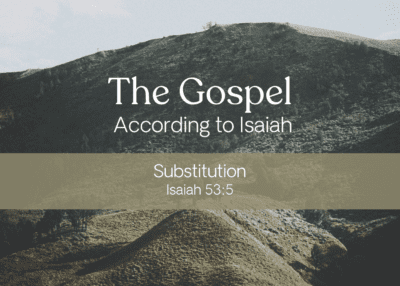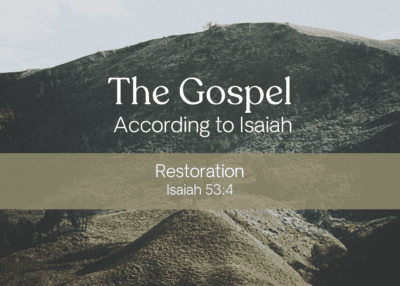What does it profit a man to gain the whole world and forfeit his soul? Mark 8:36
Jesus is saying, “You have a soul and your soul is of great value.” Your soul is your life—all that makes you the person you are. It’s the seat of your memory, feelings, imagination, convictions, desires, and affections.
We taught our children what a soul is using these words: “I have a soul. It’s inside me. I can’t see it. But it lasts forever.” Your soul is of greater value than the whole the world.
We looked last week at why this is true. Your soul is breathed into you by God. It is the source of all your achievement, and it is the cause of all your sin. Your soul lasts forever. Your soul will experience everlasting joy or misery. Therefore, your soul is of great value. All of these things are taught in the Bible.
Jesus says, “What does it profit a man to gain the whole world and lose his soul?” So, your soul can be lost. It can be starved, strangled, or surrendered. To lose your soul is the greatest loss of all because it is a loss that can never be recovered.
Today we come to the message in this series that I have most wanted to bring: Your soul can be saved! This is the central message of the Bible. Your soul, though it can be lost, can also be saved.
Whether you are young or old, the message today is for you. It is about your life, your eternal future. I cannot imagine anything more important than to hear what the Bible has to say about your soul.
Peter’s theme: The salvation of your soul
Though you have not seen him, you love him. Though you do not now see him, you believe in him and rejoice with joy that is inexpressible and filled with glory, obtaining the outcome of your faith, the salvation of your souls. 1 Peter 1:8-9
Peter speaks about the soul five times in this very short letter (1:9, 1:22, 2:11, 2:25, 4:19). Here is the great theme of this letter: The salvation of your soul! How your soul can be saved, and what this actually looks like.
That question is answered most clearly in 1 Peter 2, which is our focus today: “He himself bore our sins in his body on the tree, that we might die to sin and live to righteousness. By his wounds you have been healed. For you were straying like sheep, but have now returned to the Shepherd and Overseer of your souls” (1 Peter 2:24-25).
My wife Karen and I have will have been married for 34 years this summer, but at one point I wondered if we might not get started.
To marry in England, the bride and the groom have to register in the place where each of them lives. A few months before the wedding, I had moved into our future home in London, and Karen was at her family home near the town of Torquay in Devon. She went to register there, and I went to register in London.
I walked in and said to the registrar, “My name is Colin Smith. I recently moved into the area. I want to register to be married, and the wedding is taking place in Torquay.”
“I’m sorry,” she said, “I don’t think I can help you with that.” This came as somewhat of a surprise to me.
I said to her, “I have my birth certificate. I have my passport and my driving license, what else do you need?”
“Oh, I don’t think I can deal with this,” she said. “I had better go and see my manager.”
Off she went, and a few minutes later she came back and said, “Well, all we can do is give you a government confirmation of identity, but that’s it.”
“Look,” I said, “I don’t understand the problem. I am living in this area. I have all of my paperwork. All I want to do is register to be married in Torquay.”
“Oh,” she said, “Torquay! I thought you said Turkey!”
A small misunderstanding can make a world of a difference!
The enemy of your soul is the master of small distortions that bring people into complete confusion about how their souls can be saved.
Three Distortions of the Gospel
I want to give you three commonly believed distortions of the gospel and then to measure them against the Bible so you can see the distortion, and therefore, come to a knowledge of the truth.
The greatest tragedy of all is for a person to think themselves a Christian, only to find out on the last day that they were not one at all.
Many of you will have a carbon monoxide detector in your home. You have it because you want to detect poison, and you know that if you breathe in carbon monoxide, it will kill you.
So you buy an alarm, and you want that alarm to go off very loudly with that shrieking noise if there is carbon monoxide anywhere near you. My job is to be your alarm today.
DISTORTION #1:
Jesus died, so I’m ok
This is a dangerous distortion because it contains such a precious and wonderful truth: Jesus died! Look at what Peter says about that here: “He himself bore our sins in his body on the tree” (1 Peter 2:24).
Peter is talking about the cross, which he describes as a tree. And he is telling us what happened when Jesus suffered and died there: “He bore our sins in his body.”
Notice who did this. It was Jesus Christ, the Son of God. No one else ever did this, and no one else ever could: “He himself bore our sins in his body on the tree.”
So here is this wonderful gift: Jesus died for our sins. He bore them. He took into his own body the guilt of our sins. He bore the punishment of divine justice that was due to them. That’s why Isaiah says, “the punishment that brought us peace was upon him” (Isaiah 53:5 NIV).
We hear this and it is natural to say, “Jesus died for our sins, so our sins are forgiven.” But I want to ask you this question: Whose sins are forgiven? That’s the important question. If he bore our sins, then who is included in the our?
To answer this question, you have to look at the second half of the verse: “He himself bore our sins in his body on the tree, that we might die to sin and live to righteousness” (1 Peter 2:24).
Jesus died for sins in order that there might be a change in us. He bore our sins so that we might die to sins. The our whose sins Jesus carried is the we who die to sin and live to righteousness. This is very different from the casual confidence that says, “Jesus died, so I’m ok!”
In my teenage years, God got my attention when I heard Dr. Alan Redpath say, “God has not promised to forgive one sin that you are not willing to forsake.”
Matthew Henry says, “No man can depend safely upon Christ, as having borne his sin and expiated his guilt, till he dies unto sin and lives unto righteousness.”
Do you see what he is saying? You cannot say that he bore your sins, unless you are in the business of dying to your sins. If you believe that your sins are forgiven, that your soul will be saved, and that everything is ok between you and God, here’s the question: How is it going with your dying to sin and living to righteousness?
It is not safe for you to drift through life saying, “Jesus died for sins, so I’m ok, irrespective of how I live.” The Bible tells us: “He bore our sins in his body on the tree…” Why? So “that we might die to sin and live to righteousness” (1 Peter 2:24).
DISTORTION #2:
I believed, so I’m ok
Again, this is a dangerous distortion, because it contains a very important truth: Salvation is by grace through faith in Jesus Christ. We read from 1 Peter 1:9 that the outcome of your faith is the salvation of your souls. But faith is much more than signing off on a creed.
Some folks have the idea that if they believe Jesus died for their sins, or if at some time in their life they said that they believed this, then their souls are saved.
But there’s much more to being a Christian than believing that Jesus died for your sins: “You were straying like sheep, but have now returned to the Shepherd and Overseer of your souls” (1 Peter 2:25).
Peter is presenting Jesus Christ to us, and notice what two things he is putting together: Jesus is the Savior who died on the cross; he is also the Shepherd who rose from the dead! Being a Christian is more than believing in the Savior who died; it is submitting to the direction of the Shepherd who lives.
Think about the wonderful picture Peter gives us here of the shepherd and his sheep. The shepherd cares for the sheep, guards the sheep, provides for the sheep. But more than that, the shepherd owns the sheep.
William Still wrote a book called, “The Work of a Pastor,” that has been very helpful to me. In it, he asks the question, “What does it mean to shepherd the flock of God?” Here’s how he answers that question on the first page of the book…
“Israel’s sheep were reared, fed, tended, retrieved, healed and restored – for sacrifice on the altar of God… This end of all pastoral work must never be forgotten – that its ultimate aim is to lead God’s people to offer themselves to Him in total devotion of worship and service.” ii
What does it mean for Christ to be the Shepherd and Overseer of your soul? It means all that you are and all that you have are at his disposal. It means you offer yourself to him in total devotion of worship and service. There is a giving of yourself into his hands.
Think about how you deal with your money. Your money has value, so what do you do with it? One thing you could do is stuff it under your mattress. You might say to yourself, “It’s my money, and I want to keep it where I can see it. I’m not going to trust it to a bank or to anyone else. It’s too valuable to let it out of my sight.”
My guess is that most of you don’t do that. You say to yourself, “My money is valuable, and I want to put it in a place where it is safe and where it will grow.” So you select funds, and you trust your money into the safest hands you can find.
Now what about your soul? Your soul, Jesus says, is of far greater value than your money. If you say, “Well, this is my life, and I am going to do with it as I please,” you are doing the spiritual equivalent of stuffing your money under the mattress. It’s the least safe thing you can do.
“You have a soul,” Jesus says, “and it is more valuable than all the world. If you keep your life in your own hands, you will lose it.”
There is a Savior, a Shepherd, an Overseer, a Guardian of souls, one to whom you can trust your soul. You can invest your soul with him. His name is Jesus Christ, and if you will trust your soul, your life, all that you are, into his hands, your soul will prosper. Your life will become more.
There is an enigma that we are trying to understand in this series: In the act of losing your life by giving it into the hands of Jesus Christ, you will actually save it and keep it for eternal life.
There is nothing greater in this world than being able to say, “The Lord is my shepherd.” Because then you can say, “I shall not want.” You can say this because your life, death, and eternity are all in his hands. Do you see how much more this is than merely saying, “I believe, so I’m ok”?
DISTORTION #3:
I’m on a spiritual journey, so I’m ok
Again, this is a dangerous distortion because it does contain a very important truth. The Christian life can rightly be described as a journey. Jesus spoke about the narrow way that leads to life (Matthew 7), and he himself said, “I am the way, the truth and the life” (John 14:6), and “no one comes to the Father except by me.”
John Bunyan used the picture of a journey when he wrote “Pilgrim’s Progress.” He pictured the life of a Christian as a journey to heaven in which we pass through many difficulties. But Bunyan’s depiction of the journey had a definite path and a clear destination.
In our culture, the spiritual journey has become a metaphor for the sum total of a person’s spiritual experience: Any faith you have, any doubts you have, any experiences you have, all become the soup of your journey, and the journey becomes an end in itself.
Here’s the problem: There is a spiritual journey on the way to being lost, as well as, a spiritual journey that ends with being saved. Your spiritual journey cannot save you. Spend your life as a wandering sheep, and you will spend eternity as a lost soul. Only the Good Shepherd, Jesus Christ, can save you. No one is saved by going on a spiritual journey.
Compare the vagueness of this spiritual journey with what Peter says here, and you will see that there is a vast difference: “For you were straying like sheep, but have now returned to the Shepherd and Overseer of your souls” (1 Peter 2:25).
Peter says, “You were straying like sheep.” There’s the journey! You were wandering all over the place in confusion. You were lost, not really knowing what you believed or to whom you belonged. But you have now returned! He does not say, “You are in the process of returning.” He says, “You have now returned.” It is a definite completed action.
There is a whole journey of following Christ, and growing in Christ, but what Peter is making abundantly clear is that the Christian life begins with a definite return to Jesus Christ as the Shepherd, Owner, Overseer, and Lord of your life.
You see this all over the Bible, but let me underline it from two places. The first is Luke 15 where Jesus told the Parable of the Lost Sheep. The shepherd goes and finds it, lays it on his shoulders and brings it home. There is a definite return. The sheep was lost, but it has been brought back into the field, and now it is found. The reason the sheep is no longer lost is that it is once again under the direction of the shepherd.
Then Jesus told another story about a lost son. The son went into a far country and indulged himself in “reckless living.” Then there was a great famine, and he said to himself, “I will arise, and go to my father” (Luke 15:18). He decided to return. And when he came back to his father, he said, “I have sinned against heaven and before you.” Returning to his father meant leaving his life of sin. He couldn’t bring it back with him.
A friend gave me this marvelous quote from Spurgeon on this story, “He [the Prodigal Son] left the swine-trough: more, he left the wine cup, and he left the harlots. He did not go with the harlot on his arm, and the wine cup in his hand, and say, ‘I will take these with me, and go to my father.’ It could not be. These were all left, and though he had not goodness to bring, yet he did not try to keep his sins and come to Christ.” iii
I want to show you how clearly the Bible speaks about this. Isaiah the prophet says: “Seek the LORD while he may be found; call upon him while he is near; let the wicked forsake his way, and the unrighteous man his thoughts; let him return to the LORD, that he may have compassion on him, and to our God, for he will abundantly pardon” (Isaiah 55:6-7).
The kind of returning that Peter and Isaiah are talking about means forsaking. This forsaking is both in our ways and in our thoughts. I quit my known sins. I forsake my wicked ways. I quit thinking that I can live for myself and still call myself a Christian. That is a wicked thought. I quit thinking that I can define right and wrong for myself. No, there’s a Shepherd. There’s an Overseer. There’s a Lord.
Returning also means submitting: I submit my life to Christ as the Shepherd and Overseer of my soul. I submit my life to Christ’s Word, so that with his strength, I can go on dying to sin and living to righteousness.
The starting point for being a Christian is that Jesus Christ is your Lord. And when he is your Lord, you can rightly call him your Savior.
The Lord is my shepherd. If Christ is not your Lord, how can he be your shepherd? And if Christ is not your shepherd, why would you think he is your Savior?
Bunyan says, “There is a way to hell, even from the gates of heaven.” And there is a way to hell, even from the pews of an evangelical church.
One of Two Things Will Happen to Your Soul
You have a soul that is of greater value than the whole world. One of two things will happen to your soul: Your soul will be saved or your soul will be lost. I want your soul to be saved.
There is a Shepherd and Overseer; a Savior and Lord who is able to save your soul. He is able to do it because he died for sins. No person who comes to him will ever be turned away. No soul that is trusted into his hands will ever be lost.
Have you returned to him? Have you forsaken your sins? Are you ready to do that today? Have you crowned him as Lord of your life? Are you ready to do that today? Or are you determined to do the spiritual version of putting your money under your mattress?
Jesus says to you today, “The one who saves his life will lose it,” but then in love he appeals to you: “The one who loses his life for my sake will keep it forever!”
[elementor-template id=”128476″]





